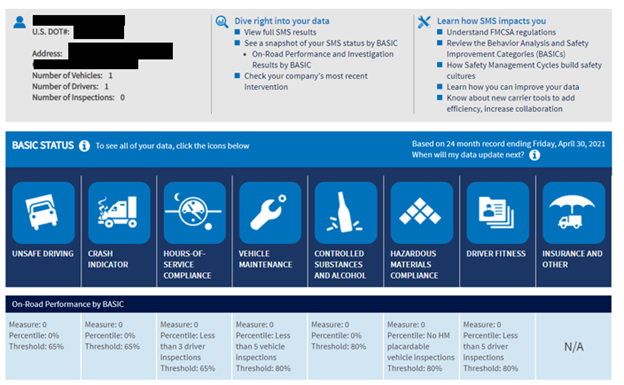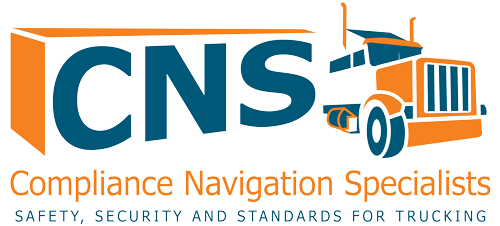What Are CSA Scores and How Do I Check CSA Driver Scores?

For a CSA score check, login to the FMCSA’s Safety Management System (SMS) website with your DOT number and DOT pin. This allows you to see “ALERTS,” which are critical for FMCSA audit selections!
Did you know that “CSA” stands for compliance, safety and accountability? That’s right, and they are critical for the Federal Motor Carrier Safety Administration (FMCSA) to identify high-risk motor carriers!
But what exactly are CSA driver scores?
Basically, CSA scores reflect a motor carrier’s safety risk and measures if a trucking company is managing their safety program well or poorly. This risk level has serious consequences.
Here’s how bad CSA scores can ruin your business:
- FMCSA sees potential crash risk and will increase your fleet’s chance of a DOT audit or roadside inspection
- DOT inspectors may catch violations and your business will face heavy fines
- Insurance companies sees a safety risk and will increase your insurance premiums or cancel your insurance altogether
- Brokers and shippers lose trust that you will transport loads safely and will increase load costs, may drop you as a trusted customer, or blacklist you if looking to create new broker relationships
On average, motor carriers regulated by the Department of Transportation paid over $27 million in fines each year with an average fine per case costing a carrier over $5,000.
Let’s take a closer look at what CSA scores are, what CSA scores mean, how to check your CSA score, and how to lower bad CSA scores.
How are my CSA scores calculated?
Your CSA ratings are based on multiple factors called Behavioral Analysis
and Safety Improvement Categories or “BASIC” categories (now “Compliance Groups”). Roadside inspection violations, as well as investigation results, fall under 1 of 7 categories, including:
- Unsafe driving – moving and parking violations, such as speeding, improper lane changes, no seatbelt, cell phone/handheld device use, improper parking, etc.
- Crash indicator – DOT reportable crashes (injury, towaway or fatality)
- Hours of Service (HOS)
compliance – falsifying your record-of-duty status, inadequate paperwork for ELD, driving, on-duty and rest break violations - Vehicle maintenance – mechanical issues and not making required repairs
- Controlled substance/alcohol – driving under the influence
- Hazardous materials compliance – unsafe or incorrect handling and/or documentation of hazardous materials, including improper or inadequate placards
- Driver fitness – Unfit to drive due to physical health or lack of training (sickness, no medical card, driving a vehicle you are not qualified to drive (i.e.- tanker with no ‘N’ endorsement, etc.)
Data collected over the last 24 month from crash reports, roadside inspections, and DOT interventions are used to calculate a carrier score. The more recent events are weighted more heavily.
If you have incorrect violations, challenge now with the DataQ process.
Each time you get a violation, depending on the category and severity of the violation, points are added to your CSA scores, and range from 1 to 10 (less to more severe).
The “safety scale percentages” (CSA scores) in each category are compared to other motor carriers with similar registration information and range from 0 to 100 percent. You want your percentage or CSA score to be as low as possible. For example, a 5% score in “vehicle maintenance” means that your company is safer than 95% of motor carriers on the road.

Each BASIC has an established percentage threshold that, if met or exceeded, will generate a DOT intervention action by first sending you a CSA warning letter.
Related article: Understanding the CSA Intervention Process and the Importance of Warning Letters
The chart below lists some of the top unsafe driving violations that will affect your CSA scores.
| Violation | Severity/Points |
| Driving a CMV while texting | 10 |
| Reckless driving | 10 |
| Speeding: 15+ mph over limit or in construction zone | 10 |
| Speeding: 11-14 mph over limit | 7 |
| Driving a CMV without a wearing a seatbelt | 7 |
| Failing to obey a traffic control device | 5 |
| Following too close | 5 |
| Improper lane changes, turns, or passing | 5 |
| Failing to yield right of way | 5 |
| Having or using a radar detector | 5 |
| Speeding: 6-10 mph over limit | 4 |
| Having unauthorized passengers | 1 |
What do my CSA scores mean?
Your CSA scores are used to identify you as a safe driver or a high-risk driver, which can help or hurt you and your carrier in several ways.
- Insurance rates – The higher your CSA scores, the higher your insurance premiums, and the lower your CSA scores, the lower your insurance premiums.
- DOT audits and roadside inspections – The lower your CSA scores, the fewer compliance checks you will have, including DOT audits and roadside inspections.
- Clients – CSA scores are public and can be seen by current or potential clients. If you want to maintain or grow your client base, keep low CSA scores.
- Drivers – Having good CSA scores can help you retain current drivers and recruit new drivers. Good drivers want to work for a company that is safe.
Actively managing the Safety Measurement System (SMS) scores is crucial to motor carriers, underwriters, and how risk is measured in the trucking industry.
Insurance premiums are a major contributor to trucking companies having to close their doors. As premiums increase, they will eventually get to the point of being unaffordable, causing many trucking companies to go out of business.
For this reason, it is important to note that receiving a warning for one of the above violations can still affect your insurance premiums. Just because you did not receive a ticket does not necessarily mean you are in the clear. In other words, a driver vehicle examination report, which is what an officer uses to report CSA violations, can be issued without a citation.
How to check my CSA scores?
The FMCSA’s Safety Management System (SMS) website makes all data available and is updated on a monthly basis for your CSA score check.
To check the full details of your CSA scores, you will need your DOT number and your DOT pin number. This allows you to see “ALERTS,” which are a determining factor of FMCSA audit selections and are issued when a percentage score is over the limit for what the FMCSA considers safe.
Without your DOT PIN number, you cannot see percentage scores or ALERTS, as this information is not public, only the “raw data” is public. Your PIN is on the top left of your “New Entrant Audit” letter from the FMCSA. If you have this letter, it is important that you write down the DOT PIN.
If you do not know your DOT PIN number, contact us and we can retrieve it for you from the FMCSA for a very small fee.
If you drive under your carrier’s DOT number, your CSA score and any violations would be under their DOT.
It generally takes 20 good inspections to offset one bad inspection, so carriers need to make sure any bad inspections on record are valid, accurate, and warranted.
If you are challenging any inspection data through the DataQ process, be sure to:
- Have clear evidence for why the inspection data is incorrect, such as ELD records, photos, eye witness accounts, etc.
- List the issues, such as missing records, incorrect information, violation was assigned to the wrong carrier, or duplicated data
If you need help with the safety rating upgrade process, CNS are experts analyzing why your scores are bad, creating a plan to fix them, and upgrading you successfully.
How can I lower my bad CSA scores?
You can improve on your bad CSA scores by putting a system in place to check the BASICs regularly and then being proactive in managing risky areas.
When reviewing your BASICs, determine what categories you need improvement in and put training in place to improve in those particular areas. Then document the training so DOT inspectors and insurance underwriters can see your progress in these areas.
Roadside inspections with no violations also cause your scores to lower faster! Violations will reduce in “severity” after 6 months, 13 months, and then are removed from your CSA record completely after 2 years.
If your CSA score is low, you can maintain it by:
- Hiring drivers with good PSP scores (the FMCSA pre-employment screening program, includes MVR information and all CSA violations a driver has had for 3 years),
- Providing adequate on-board and recurring training,
- Running internal inspections,
- Maintaining regular preventative vehicle maintenance, and
- Using an ELD solution to avoid maintenance violations and driver hours-of-service violations.
How will Proactive Safety Management® lower my CSA score?
Carriers being proactive will put them in a better position to mitigate risk, improve efficiencies, reduce costs, and spend more time with their drivers in an effort to manage a safe and compliant fleet.
With proactive safety, carriers will be more organized and will have a measured plan to lower motor carrier Safety Measurement System (SMS) scores.
While data and paper management can be crucial, using a third-party partner will help you be prepared for audit representation, provide document storage, and offer up-to-date company policies and handbook of FMCSA rules and regulation changes.
Not only will proactive safety help your fleet with DOT compliance, but it is proven to lower insurance premiums as you will have documented ways to show a reduction in risk.
Our safety management programs are perfect for combining multiple services and can be tailored to fit your needs, whether you are a new owner operator or a seasoned trucker or business owner.
When partnering with a third-party program, your fleet has a team of experts that costs much less than hiring a safety director or team and can receive constant monitoring to keep your operation FMCSA compliant. Driver management will be simplified and the driver hiring process will shorten.
At CNS, our DOT Compliance Programs focus on Proactive Safety Management® (PSM), a mindset that will ensure your fleet’s safety and compliance is always in order and ahead of the FMCSA.
Our PSM Motor Carrier Program includes:
- ELD management
- Driver Qualification File Management
- New driver on-boarding
- Driver safety meetings
- CSA score management
- Policies and handbooks
- Vehicle maintenance
- and more
Learn more about our DOT Compliance Programs or fill out the form below.
Questions about DOT Compliance, Licensing, Audits, Programs, etc.?
Our DOT Specialists are here to help!
What are you searching for?
Is DOT Compliance your Top Priority?
Our DOT Compliance Programs ensure it is your top priority and keeps your business running.
Related Services
Subscribe to our Monthly Newsletter
Receive the latest transportation and trucking industry information about FMCSA and DOT Audits, Regulations, etc.
Related news
Trucking News
Get the latest trucking news on DOT Compliance, Licensing, Audits, and more!

Paper Medical Cards Still Valid: FMCSA Issues 60-Day NRII Transition Waiver for CDL Drivers
The Federal Motor Carrier Safety Administration (FMCSA) has issued a new waiver related to the National Registry II (NRII) medical certification process, extending temporary flexibility

Deregulation or Disruption? Inside the FMCSA Rule Changes That Could Reshape Trucking in 2026
A Practical Breakdown of New FMCSA Rules in 2026: What’s Changing, What’s Slowing Down, and What Fleets Should Prepare For From a government shutdown to

FMCSA Removes or Warns 7,500 CDL Training Providers: What It Means for New Drivers and Why CNS Driver Training Center Stands Apart
The trucking industry just experienced one of the largest federal crackdowns in CDL training history. Lawmakers have been urging the U.S. Department of Transportation (USDOT)
